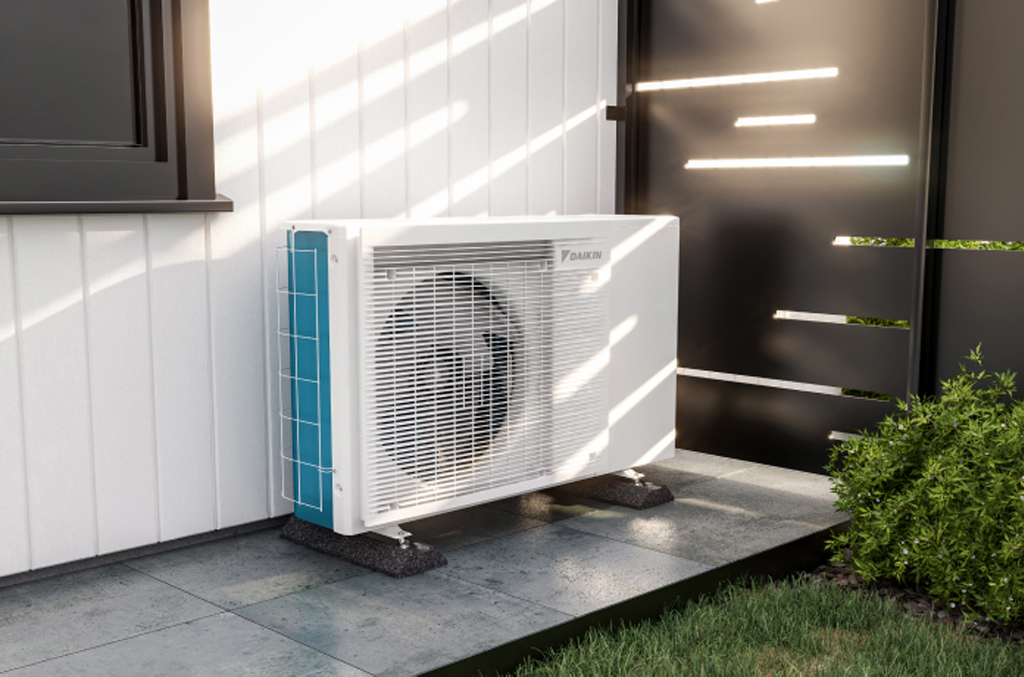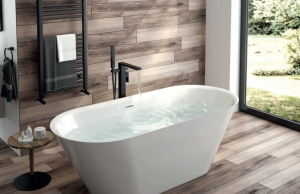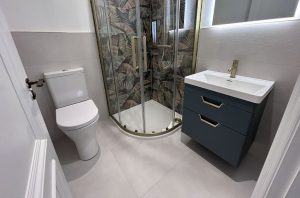1. What is an air source heat pump?
- An air source heat pump (ASHP) is placed outdoors & gathers heat from the air (condenser) transferring it into your heating system.
- A refrigeration process enables energy to be gathered, even at very cold temperatures (-25°C).
- Can be compared to a fridge in reverse. When food is placed in a fridge heat is extracted from the food to cool it down and is discarded out the back.
- The heat pump works in the same way except uses the heat.
2. Why choose an air source heat pump?
- More efficient system (350 – 400%) compared with oil 90%.
- Reduced running costs. Typically, 30 – 35%.
- Increased comfort levels with weather compensated controls.
- Perfect for well insulated new build dwellings.
- Electrically powered which eliminates fluctuation in fuel costs, associated with oil.
- Monthly direct debit payments.
- Reliable with minimal maintenance.
- No need to burn fossil fuels.
- Helps the environment with reduced co2 levels.
- Government directives are phasing oil heating out.
3. Difference between oil & air source?
- Oil system is typically designed with a flow temperature of 60 -70°C, whereas ASHP is 25 – 50°C.
- Heat pump with weather compensation changes it’s flow temperature automatically based on the outdoor temperature, providing greater comfort levels in the house.
- ASHP is powered by electricity. Typically, 1 unit of electricity for every 3 to 4 kW’s of energy.
- No oil tank or flue pipe required as the ASHP is not a combustion process.
4. Will I require a back up oil boiler?
- No. ASHP’s are designed to provide 100% of the heating and hot water.
- This is also dependent on the size of the house, but if it is a new build and less than 350m2 then the ASHP will be able to meet the demand.
5. Will the heat pump provide heat all year around?
- Yes. The systems are designed to operate down to -25°C outside and can operate in the most extreme of climates.
6. What about my electricity connection?
- You will need to contact NIE to advise them that you want to install a heat pump in your new build. NIE are very familiar with heat pumps and will request specific detail on the heat pump that we provide. Normally an 80 Amp supply will suffice.
7. What about Economy 7?
- It is advisable to request this connection so you can avail of the cheaper electricity rate for 7 hours a day. The heat pump is scheduled to operate 50% during the Economy 7 Rate and 50% during normal rate.
- Economy 7 times are 1.00 – 8.00am.
8. Will it heat my hot water?
- Yes. The heat pump will heat the hot water to 48°C which is enough for bathing and
washing. New heat pumps with R32 can heat the hot water to 55°C. - The hot water operation is automatic and usually programmed for the morning and the evening. Legionella protection is built in, so it operates weekly to heat the hot water tank to 60°C, using the cylinder immersion.
9. Why is underfloor heating better with a heat pump?
- Underfloor heating can heat your house to 21/22°C with a lower design flow temperature
- of 35°C. The lower the flow temperature from the heat pump the more efficient the heat pump is.
- In addition, as underfloor heating is a radiant heat it provides better comfort levels with the heat pump. The weather compensation in the heat pump that adjusts the flow temperature of the heat pump based on the outdoor temperature matches the kW output of the heat pump exactly to the house. Reduces overheating or underheating.
10. Can I use radiators?
- Yes. Radiators can be used but underfloor is the preferred option especially for the ground floor. Radiators will be designed to operate at a flow temperature of 45 – 50°C






